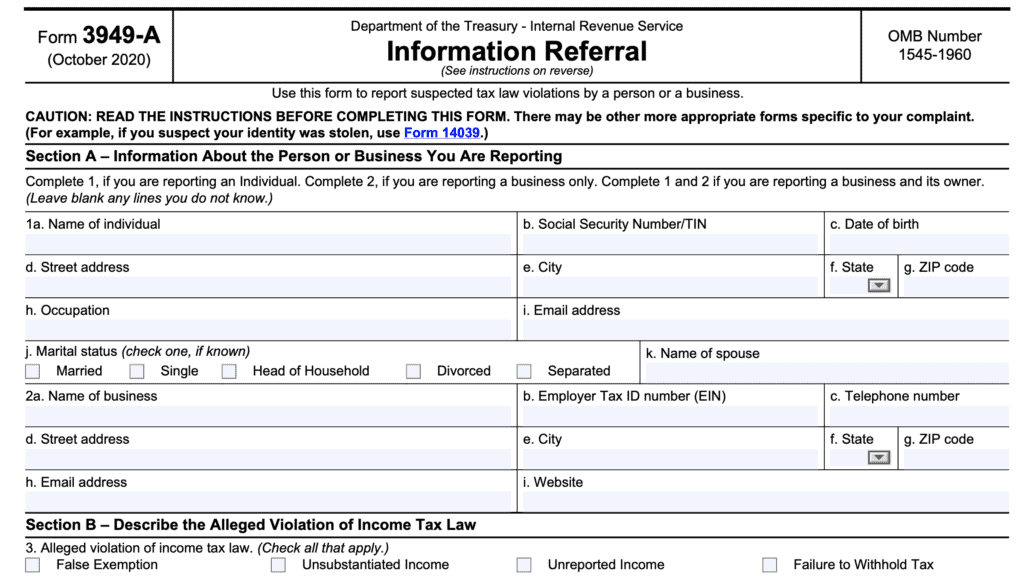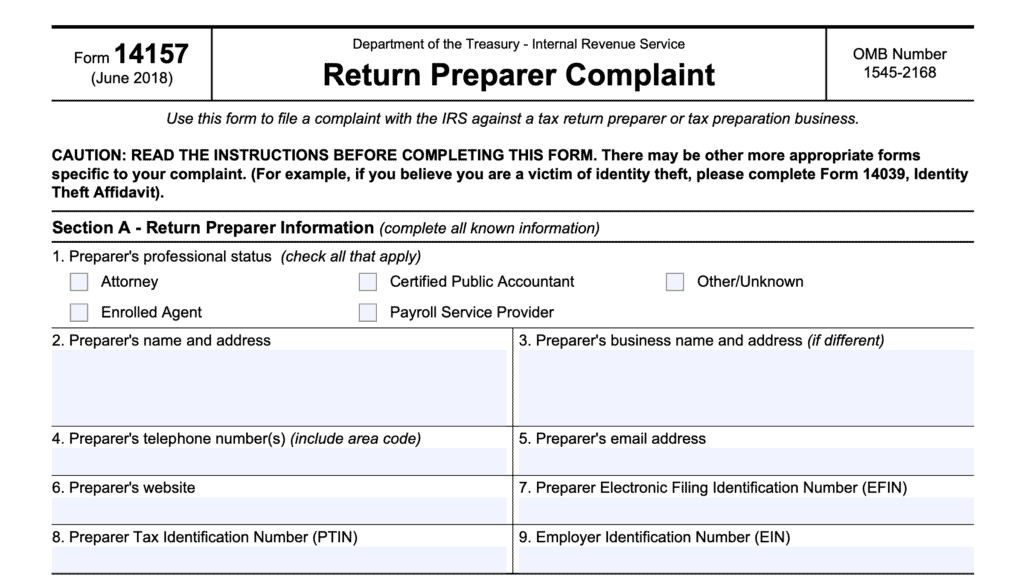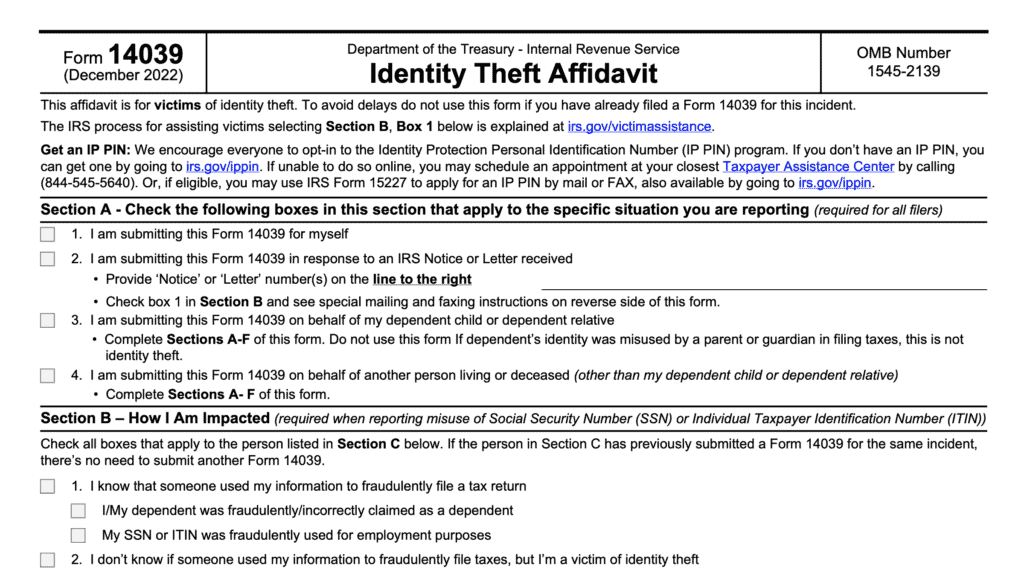IRS Form 13909 Instructions
Federal tax law gives tax-exempt organizations certain rights to avoid taxation in the interest of public welfare. When a nonprofit organization abuses its tax-exempt status, someone can report them to the Internal Revenue Service using IRS Form 13909, Tax-Exempt Organization Complaint (Referral).
In this article, we’ll walk through this process step by step, including:
- How to complete Form 13909 to initiate your complaint
- How to file your completed form
- Additional things you should know about reporting a tax-exempt organization to the authorities
Let’s start by going through this form, step by step.
Table of contents
How do I complete IRS Form 13909?
The newest version of IRS Form 13909 is broken down in the three parts:
- Referred Organization Information
- Details of Alleged Violation
- Submitter Information
Let’s walk through this IRS form, step by step, beginning with the Referred Organization Information fields.
Referred Organization Information
Lines 1 through 7 should contain information about the organization that you’re reporting to the Internal Revenue Service.
Line 1: Name of referred organization
Enter the referred organization’s name. If the organization has used prior or multiple names, provide that information as well.
Line 2: Street address
Enter the tax exempt organization’s street address in Line 2. If the organization has used multiple addresses, provide them as well.
Author’s note: Although the form instructions state that you should enter multiple addresses, it’s not clear how to do so in Lines 2 through 5.
You may consider making a note in the space provided in Line 12, below. You can use multiple sheets for additional information, if the space provided is not enough.
Line 3: City
Provide the organization’s city in this line.
Line 4: State
Use the drop-down box to indicate the state where the tax-exempt organization is located.

Line 5: ZIP Code
Enter the zip code here.
Line 6: Date of referral
Enter the date that you submitted this copy of IRS Form 13909.
Line 7: Organization’s employer identification number (EIN)
In this field, enter the organization’s nine-digit employer identification number, or EIN. This is the tax exempt organization’s taxpayer identification number.
If you do not know the organization’s EIN or cannot find it, you may enter the entity’s state nonprofit corporation registration number, if you know it.
Details of Alleged Violation
In this part, you’ll need to provide specific details of the alleged violation. This will include:
- Names
- Actions
- Places
- Amounts
- Dates
- Nature of any evidence or documentation
Also, be sure to include the names of other organizations, entities, or persons that may be involved. If available, provide EINs and Social Security numbers (SSN).
Line 8: Name(s) of Person(s) Involved
In Line 8, enter the name or names of the persons involved.
Line 9: Organization Title(s)
Enter the organization’s title here. If there is more than one organization, list all of them.
Line 10: Date(s)
List the date or dates that the potential misconduct occurred.
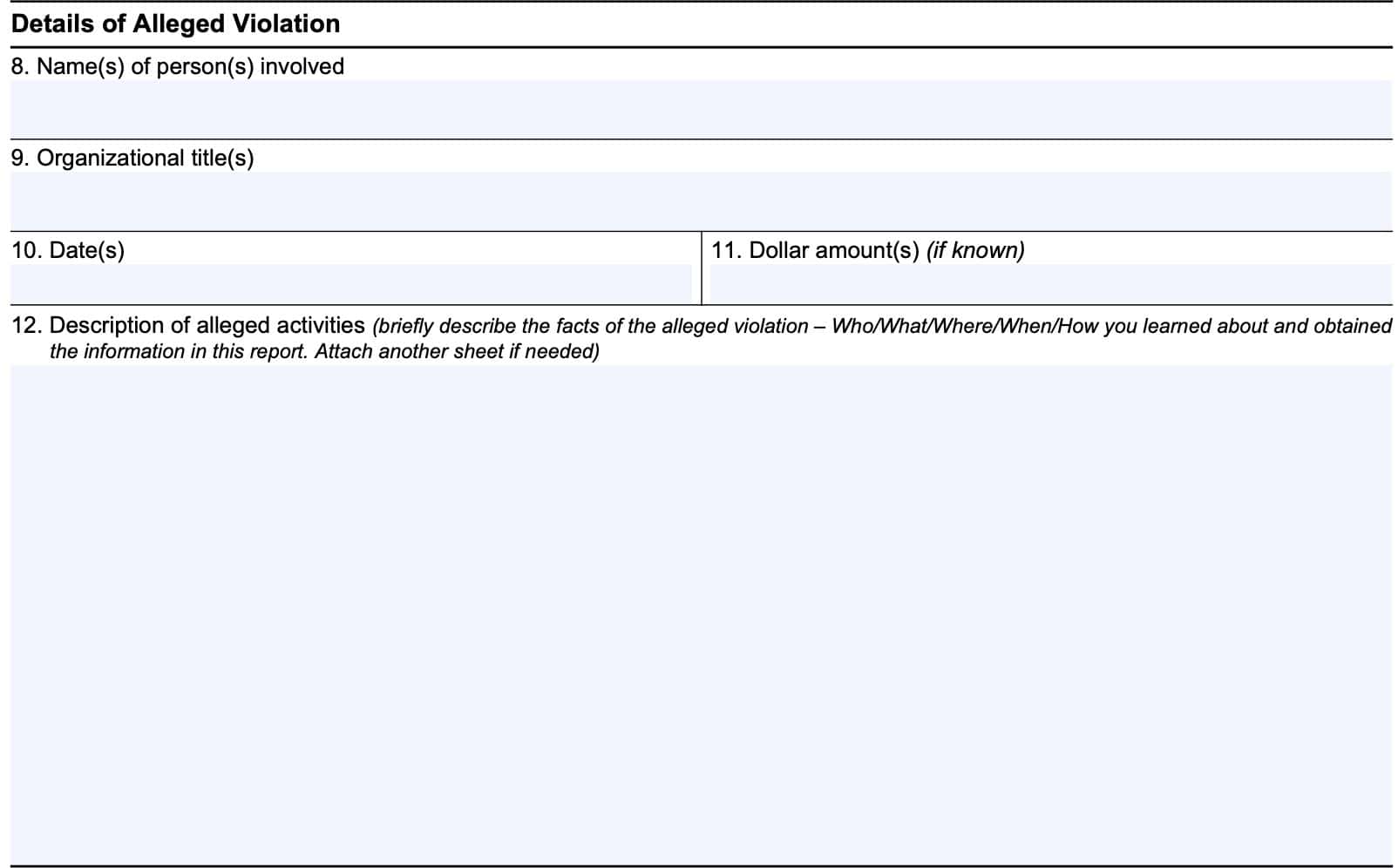
Line 11: Dollar amount(s), if known
If you know dollar amounts related to the alleged violations, enter that amount (or an estimate) in Line 11.
Line 12: Description of alleged activities
Include as much information in the space provided. The form instructions do not provide much more clarity.
If you’re not exactly sure what information to provide, see the Types of Violations section, later in this article. Once you’ve identified the type of offense you’re trying to report, then include as much relevant information (either in writing or as supporting documents), as possible.
Submitter Information
In this section, include your personal information. For whistleblowers or other persons who are concerned about retaliation, there are special instructions on how to proceed.
Line 13: Name
Enter your name here.
If you are concerned about retaliation or reprisal
According to the form instructions, you may enter “Anonymous” for Submitter’s name if you do not want to be identified.
There is nothing in the instructions about Lines 14 through 19, but my assumption is that the IRS does not need this information if you choose to remain anonymous. There are two considerations to think about.
- The IRS does send an acknowledgement letter to persons who file IRS Form 13909. If this is important to you, then you may wish to include your mailing address.
- Some reported offenses warrant a whistleblower’s reward. Taxpayers can file a claim for whistleblowers rewards on IRS Form 211. It may be difficult to claim the reward without providing contact information.
Line 14: Occupation or business
Enter your occupation or business name in this field.
Line 15: Street address
Enter the street number and name of your home address.
Line 16: City
Enter the name of the city where you live.
Line 17: State
Use the dropdown box to indicate your state.
Line 18: ZIP Code
Use Line 18 to indicate your ZIP code.
Line 19: Telephone number
Enter your telephone number in Line 19.
Line 20
Check the box to indicate that you are concerned about retaliation or retribution if your identity is disclosed.
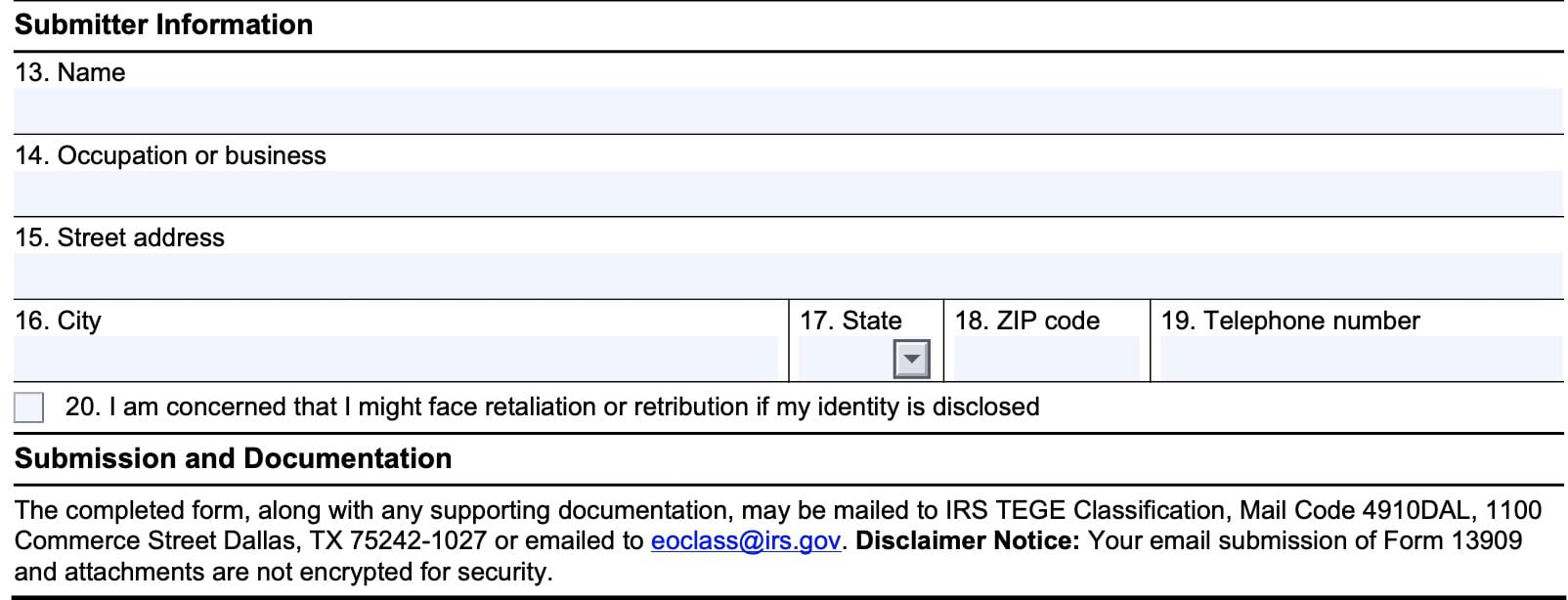
How do I file IRS Form 13909?
On the form itself, there are several ways that are outlined. You may file this form by mail, fax, or email.
Regardless of how you file Form 13909, you may consider whether you are eligible for an award for a whistleblower claim. If your referral of an exempt organization is entitled to an award, you may consider filing IRS Form 211, Application for Award for Original Information, with your completed Form 13909.
File by mail
Mail your completed form as well as supporting documentation, to the following address:
IRS EO Classification
Mail Code 4910DAL
1100 Commerce Street
Dallas, TX 75242-1198
File by fax
On the 2016 version of this form, there was an option to fax the completed Form 13909, along with supporting documentation, to the IRS at: (214) 413-5415.
However, this information is no longer on the updated form, which indicates that faxing your submission may no longer be an option.
File by email
If you prefer to send by email, you may email your documents to the IRS: eoclass@irs.gov. Please note that any submitted documents are not encrypted for security purposes.
What types of violations can I report on IRS Form 13909?
Anyone may file a complaint letter based upon suspected tax fraud, abuse, or other suspicious tax-related activity. In the 2023 updated version of IRS Form 13909, there isn’t a lot of clear guidance on what this looks like.
Under the prior version, Line 3 contains specific violations that are covered, either in the Internal Revenue Code, or in other guidance.
Absent other guidance, we’ve left this information in here to help you determine the type of information you may consider putting into Line 12, or attaching as supporting documentation.
Directors/Officers/Persons are using income/assets for personal gain
IRS guidance prohibits tax-exempt organizations from allowing insiders to use income or assets to be used for personal gain. For this purpose, the IRS considers insiders to include officers, directors, or any person with a personal or private interest in the organization’s activities.
This is known as inurement, or private benefit. Examples of inurement include:
- Payment of dividends
- Unreasonable compensation to insiders
- Transferring property to insiders for less than fair market value
Organization is engaged in commercial, for-profit business activities
A nonprofit organization qualifies for a tax exemption to the extent that they do not engage in commercial activities for profit. If the referral of an exempt organization indicates that the organization was engaging in for-profit activities, that organization can lose its exemption status. Additionally, civil and criminal charges may apply.
Income/Assets are being used to support illegal or terrorist activities
This is a fairly obvious point. If for-profit business activities can threaten an organization’s tax-exempt status, then supporting illegal activities or terrorist programs is definitely outside permissible practice.
Organization is involved in a political campaign
Under federal tax laws, all IRC Section 501(c)(3) organizations, including churches and religious organizations, are absolutely prohibited from directly or indirectly participating in, or intervening in, any political campaign on behalf of (or in opposition to) any candidate for elective public office.
Organization is engaged in excessive lobbying activities
Nonprofit organizations may engage in certain lobbying activities, if the lobbying is related to their tax-exempt
Organization refused to disclose or provide a copy of Form 990
As a requirement to maintain tax-exempt status, tax-exempt organizations must keep certain information available for public disclosure and inspection. Among these items is their annual tax return, also known as Form 990 series tax returns.
While a nonprofit organization must provide certain information in response to a reasonable request, there are certain important points:
- A tax-exempt organization may place reasonable restrictions on the time, place, and manner of in-person inspection and copying of public records
- The exempt organization may charge a reasonable fee for copies
- Cannot exceed the prescribed IRS rate (currently $.20 per page up to 8 1/2″ X 14″)
- The organization does not need to respond to individual requests if it makes the required information available to the general public
- An organization may not release any information that linked to the identity of any donors
Organization failed to report employment, income or excise tax liability properly
Most tax-exempt organizations have annual information reporting obligations under the Internal Revenue Code to maintain their tax-exempt status.
Although they are exempt from federal income tax, tax-exempt organizations may be liable for additional filing requirements related to:
- Employment taxes
- Unrelated business income tax (UBIT)
- Excise taxes, and
- Certain state and local taxes
Organization failed to file required federal tax returns and forms
Even though they may be exempt from income tax, tax-exempt organizations must file required tax returns and forms. A partial list of forms that an exempt organization may still have to file includes:
- IRS Form W-2
- Form 941, Employer’s Quarterly Federal Tax Return
- Form 944, Employer’s Annual Federal Tax Return
- Form 990, Return of Organization Exempt From Income Tax
- May also file Form 990-T, Form 990-N, or Form 990-EZ
Organization engaged in deceptive or improper fundraising practices
Tax exempt entities can raise funds through a variety of means, as allowed by federal tax law. However, even the most well-intentioned public charities can run a foul of IRS guidelines with respect to proper fundraising practices.
Video walkthrough
Watch this video tutorial to learn more about filing your tax-exempt organization complaint with IRS Form 13909.
Frequently asked questions
Filing a tax complaint against a tax-exempt organization is completely voluntary. The IRS does not require anyone to report suspected activity.
Form 13909 may be used to report any nonprofit organization or other organization claiming tax-exempt status. This includes charitable organizations, churches and other religious organizations, or private foundations.
You can expect that the IRS to acknowledge receipt of the complaint form in writing. However, if the IRS decides to take further action, such as a field examination, you will not receive a progress update or any additional information.
No. Federal law precludes the Internal Revenue Service from providing updates or disclosing information about specific actions taken as a result of an information referral. You should not expect to receive more than a standard acknowledgement letter from the IRS.
Where can I find IRS Form 13909?
You may find this tax form on the IRS website. For your convenience, we’ve attached the latest version to this article.

